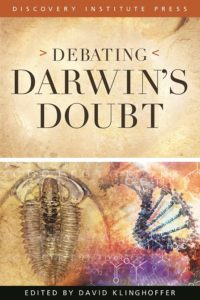 Free Speech
Free Speech
Who Really Inherited Darwin’s Legacy? You Might Be Surprised to Learn


Herman Bouma directs the National Association for Objectivity in Science. He came to my attention last year when Sarah Chaffee reported here and here on his experience being strong-armed and tossed out by the National Science Teaching Association (NSTA) at their conference in St. Louis. His offense? Merely showing up for a scheduled and approved presentation he was set to deliver to anyone interested in attending. NSTA officials and security guards hustled him out.
Darwin and His Apostles
The presentation was supposed to be in praise of Charles Darwin for Darwin’s willingness to engage respectfully with critics. Bouma recalls the incident in an article today for CNSNews, for Darwin Day. Bouma makes a great point about the difference between Darwin himself and his latter-day apostles (as, remarkably, some call themselves):
Darwin took great care to reply thoughtfully to the scientific arguments against his theory and, by the time of the sixth edition of his book [On the Origin of Species] in 1872, approximately one-third of the book consisted of his response to numerous scientific arguments against his theory (all of which still have merit today).
Darwin clearly took his critics seriously, and did so even though most were proponents of design. He never considered the theory of design to be unscientific and in fact stated that it “has been ably maintained by many authors.” (Even he theorized that the first forms of life were the result of design.) Darwin treated his critics with respect, referring to them as “the most eminent paleontologists” and “our greatest geologists”. Darwin acknowledged that there were “a crowd of difficulties” with his theory and that a number of objections carried great weight.
For example, one objection was based on the existence in certain insect communities of sterile females which “often differ widely in instinct and in structure from both the males and fertile females, and yet, from being sterile, they cannot propagate their kind.” Darwin stated that this difficulty “at first appeared to me insuperable, and actually fatal to the whole theory.”
Darwin’s response to his critics makes clear that he was interested in carrying on a civilized and rational debate, taking his critics’ objections seriously and responding to them not with deprecation, but with evidence and logic. In this respect, Darwin is an example for all to follow today. Unfortunately, many in science education today strongly oppose the mention of any arguments against the theory of natural selection.
You know what? Darwin is indeed “an example for all to follow today.” This may sound surprising from a proponent of intelligent design. But think about it: by the sixth edition of On the Origin of Species, Darwin was devoting a third of his text to engaging seriously with critics. He recognized that there were strengths and weaknesses, as we say today, to his theory. Bouma mentions a few of the leading design advocates at the time — Louis Agassiz at Harvard, Adam Sedgwick at Cambridge, Karl Nageli at the University of Munich. Darwin “took great care” to respond to able scientists like these.
A Reversed Situation
Notice how the situation has reversed itself. Darwin’s apostles generally brush off criticism, caricaturing it as “creationism,” taking shelter behind the “great evolutionary firewall” in the scientific literature. Or they pay lip service to the merit of debate. Bouma mentions a publication from the NSTA, the national education group that shut him down at the St. Louis conference. The title: It’s Still Debatable! Using Socioscientific Issues to Develop Scientific Literacy, K–5. What’s debatable? From the book description:
It’s Still Debatable! encourages scientific literacy by showing you how to teach the content and thinking skills K–5 students need to explore real-world questions like these:
- Is football too dangerous for kids?
- Do we need zoos?
- Should distracted walking be illegal?
At the core of the exploration is the Socioscientific Issues Framework. It uses debatable, science-related societal questions, or socioscientific issues, to address science content, help children learn to apply the content, and encourage them to become informed citizens.
Ah, you see, it’s fine to debate about football, zoos, and distracted walking. What about the origins of life and of biological complexity? Now, that’s a different matter. Just raising the issue, as Bouma did, will get you frogmarched out of a science teaching conference.
No “ID Firewall”
 Meanwhile it is ID scientists like Michael Behe who are, in a sense, the real inheritors of Darwin’s legacy. As Professor Behe mentioned in a recent ID the Future podcast with host Jonathan Witt, his next book is devoted entirely to exchanges with serious critics. Over at his newly expanded website, Behe has an extensive page with numerous links to articles devoted to his replies to critics of his most recent book, Darwin Devolves. Dr. Behe has, in this way, been following in Darwin’s path for decades. For design scientists today, there’s no “ID firewall” to hide behind. They would disdain to take shelter there if there were.
Meanwhile it is ID scientists like Michael Behe who are, in a sense, the real inheritors of Darwin’s legacy. As Professor Behe mentioned in a recent ID the Future podcast with host Jonathan Witt, his next book is devoted entirely to exchanges with serious critics. Over at his newly expanded website, Behe has an extensive page with numerous links to articles devoted to his replies to critics of his most recent book, Darwin Devolves. Dr. Behe has, in this way, been following in Darwin’s path for decades. For design scientists today, there’s no “ID firewall” to hide behind. They would disdain to take shelter there if there were.
So, today is Darwin Day, the birthday of Charles Darwin. What’s the best way to celebrate? John West was not being facetious earlier today when he suggested that the best birthday gift you can give to the great man is a contribution to Discovery Institute’s Center for Science & Culture. It is proponents of ID who are carrying on the truest, most noble aspect of Darwin’s legacy. For your $25 gift, you will receive a downloadable copy of a book I edited, with an appropriate debate theme, the 380-page Debating Darwin’s Doubt. Please consider taking Dr. West’s advice now.
Photo credit: Ryan McGuire via Pixabay.
